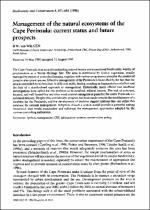 ResearchSpace
ResearchSpace
Management of the natural ecosystems of the Cape Peninsula: current status and the future prospects
JavaScript is disabled for your browser. Some features of this site may not work without it.
- ResearchSpace
- →
- Research Publications/Outputs
- →
- Journal Articles
- →
- View Item
| dc.contributor.author |
Van Wilgen, BW

|
en_US |
| dc.date.accessioned | 2007-03-14T07:04:42Z | en_US |
| dc.date.accessioned | 2007-06-07T10:08:51Z | |
| dc.date.available | 2007-03-14T07:04:42Z | en_US |
| dc.date.available | 2007-06-07T10:08:51Z | |
| dc.date.copyright | en_US | |
| dc.date.issued | 1996-05 | en_US |
| dc.identifier.citation | Van Wilgen, BW. 1996. Management of the natural ecosystems of the Cape Peninsula: current status and the future prospects. Biodiversity and Conservation, vol. 5(5), pp 671-684 | en_US |
| dc.identifier.issn | 0960-3115 | en_US |
| dc.identifier.uri | http://hdl.handle.net/10204/1895 | en_US |
| dc.identifier.uri | http://hdl.handle.net/10204/1895 | |
| dc.description.abstract | The Cape Peninsula is an area of outstanding natural beauty and exceptional biodiversity, worthy of proclamation as a World Heritage Site. The area is dominated by fynbos vegetation, usually managed by means of prescribed burning, together with various programmes aimed at the control of invasive alien plant species. Effective management of the Peninsula is bedevilled by the fact that the area is controlled by no less than 14 different public bodies, resulting in fragmentation of effort and the lack of a standardized approach to management. Historically, many official and unofficial investigations have called for this problem to be resolved, without success. The lack of coherent, focused, and well funded fire and alien weed control management plans for the entire Peninsula is a serious deficiency. Despite this, considerable progress has been made towards the establishment of a database for the Peninsula, and the development of decision support systems that can utilize this database for rational management. Adoption of such a system would provide a powerful uniting framework that would standardize and influence the management approaches adopted by the various controlling authorities. | en_US |
| dc.format.extent | 1016161 bytes | en_US |
| dc.format.mimetype | application/pdf | en_US |
| dc.language.iso | en | en_US |
| dc.publisher | Chapman Hall Ltd | en_US |
| dc.rights | Copyright: 1996 Chapman Hall Ltd | en_US |
| dc.source | en_US | |
| dc.subject | Fynbos | en_US |
| dc.subject | Information systems | en_US |
| dc.subject | GIS | en_US |
| dc.subject | Conservation policies | en_US |
| dc.title | Management of the natural ecosystems of the Cape Peninsula: current status and the future prospects | en_US |
| dc.type | Article | en_US |
| dc.identifier.apacitation | Van Wilgen, B. (1996). Management of the natural ecosystems of the Cape Peninsula: current status and the future prospects. http://hdl.handle.net/10204/1895 | en_ZA |
| dc.identifier.chicagocitation | Van Wilgen, BW "Management of the natural ecosystems of the Cape Peninsula: current status and the future prospects." (1996) http://hdl.handle.net/10204/1895 | en_ZA |
| dc.identifier.vancouvercitation | Van Wilgen B. Management of the natural ecosystems of the Cape Peninsula: current status and the future prospects. 1996; http://hdl.handle.net/10204/1895. | en_ZA |
| dc.identifier.ris | TY - Article AU - Van Wilgen, BW AB - The Cape Peninsula is an area of outstanding natural beauty and exceptional biodiversity, worthy of proclamation as a World Heritage Site. The area is dominated by fynbos vegetation, usually managed by means of prescribed burning, together with various programmes aimed at the control of invasive alien plant species. Effective management of the Peninsula is bedevilled by the fact that the area is controlled by no less than 14 different public bodies, resulting in fragmentation of effort and the lack of a standardized approach to management. Historically, many official and unofficial investigations have called for this problem to be resolved, without success. The lack of coherent, focused, and well funded fire and alien weed control management plans for the entire Peninsula is a serious deficiency. Despite this, considerable progress has been made towards the establishment of a database for the Peninsula, and the development of decision support systems that can utilize this database for rational management. Adoption of such a system would provide a powerful uniting framework that would standardize and influence the management approaches adopted by the various controlling authorities. DA - 1996-05 DB - ResearchSpace DP - CSIR KW - Fynbos KW - Information systems KW - GIS KW - Conservation policies LK - https://researchspace.csir.co.za PY - 1996 SM - 0960-3115 T1 - Management of the natural ecosystems of the Cape Peninsula: current status and the future prospects TI - Management of the natural ecosystems of the Cape Peninsula: current status and the future prospects UR - http://hdl.handle.net/10204/1895 ER - | en_ZA |





